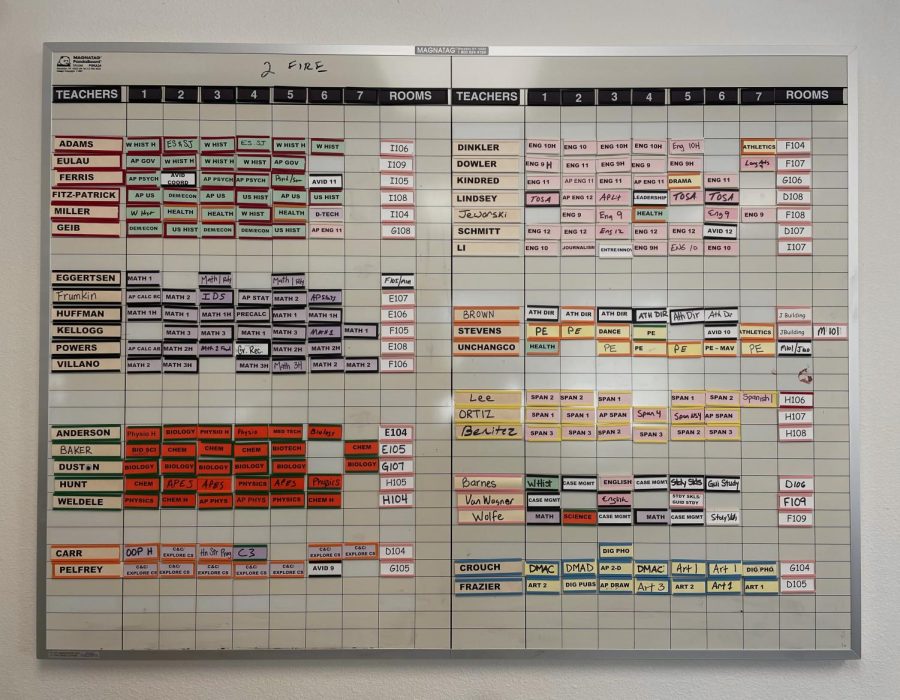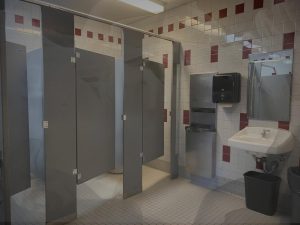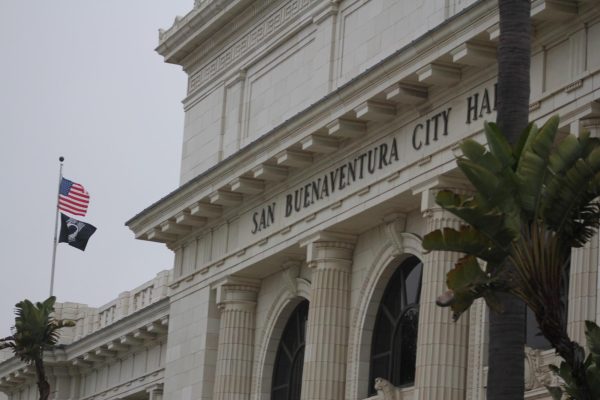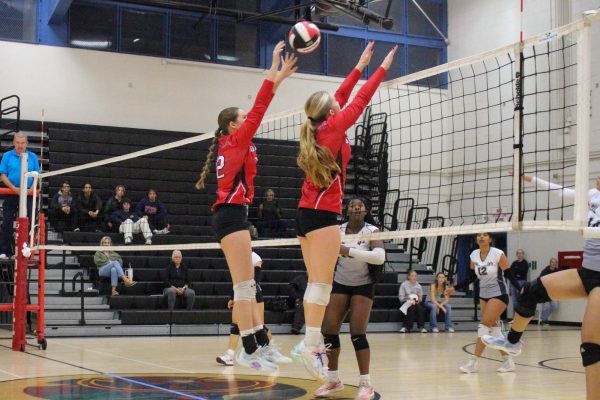Opinion: What happened to BioScience and DTech was not the result of an administrative oversight
Lila Ettedgui-Scott
Like a detective trying to solve a murder on cork board with push pins and pictures of the suspects, in Gibbs’ office hangs this magnetic board with all the teachers and classes at Foothill Tech, some scribbled in his own handwriting, arranged and rearranged to create the master schedule each school year.
October 5, 2022
Emotions are running high this fall at Foothill Technology High School (Foothill Tech) after the administration implemented a new schedule that cut two advisers’ coordinating periods for specialized career tracks. It may seem odd that students would be so impassioned over how many sections their teachers teach, but the adverse effect of the loss on Foothill Tech’s entrepreneurship and science pathways were highly publicized by the teacher advisers.
Coordinating periods were not cut as the result of an administrative error. Several factors combined led to this new reality, a reality where there might not be a man to hang for what happened to Foothill Tech’s pathways.
Principal Russell Gibbs is a very friendly and open person, yet he was guarded during this interview. I understand why. Students have been treating this highly quantitative issue like a social justice issue. Like Gibbs had some sort of bias against the Career Technical Education (CTE) programs like the BioScience and DTech pathways (science and entrepreneurship subsequently).
I think he just doesn’t have a bias for them. Gibbs seems like he just wants to serve all the students equally and fairly. There’s not much information available about what exactly happened to the coordinating periods. After speaking with Gibbs and several affected teachers, here’s what I’ve found:
Two weeks into the 2022-2023 school year, the counselors finally ran out of different ways to try and sort everyone into classes. Classrooms were overflowing and something had to give.
Generally, Foothill Tech teachers teach six periods a day, while it’s standard for teachers in Ventura Unified School District (VUSD) to teach five periods. For teachers, a six period day means six periods of instruction and a preparatory period without any students. It’s been like this since Foothill opened.
Foothill Tech houses several CTE programs; BioScience and DTech being the two largest. In the past, teachers who serve as advisers for these CTE programs have had an extra preparatory period called a coordinating period so they could fulfill these highly demanding posts.
To correct some of the more extreme overages, particularly in Freshman sections—Health classes were populated well into the forties—Gibbs opened up two new periods, one of Health and one of Biology.
Kurt Miller, the DTech adviser, and Mika Anderson, the BioScience adviser, usually teach a period of Health and a period of Biology, respectively. Freshman Health and Biology classes were overpacked, so Gibbs opened new sections where he saw some sort of leeway: Miller and Anderson’s coordinating periods.
Miller and Anderson’s FIRE students were reassigned, which gives them an extra 30 minutes four days a week, assuming they don’t have any other responsibilities during FIRE, such as helping students with homework. They were also compensated monetarily for the loss of their coordinating periods and the work that they would now have to do after school/at FIRE. But Miller and Anderson are human, as the concessions Gibbs could offer them just don’t seem like they’re going to be enough; money can’t always replace time.
There are a couple reasons why there’s such a high demand for Health and Biology classes in the first place. Neither Anthony Unchangco or Heather Ferris, two names that used to be synonymous with Health class, teach as many sections of Health as they normally would. Unchangco teaches one and Ferris doesn’t teach any.
Unchangco teaches five periods of Physical Education (PE) and Ferris has an extra period of Psychology: Sociology and Psychology — a college preparatory (CP) version of AP Psychology. Something similar happened when the school opened up a period of CP Physiology, which took up a period that Anderson would traditionally teach Biology during, but the class was quickly combined with a section of Honors Physiology.
Also, unique to this year were the several intervention periods that Gibbs had to open up: three in Math, one for English. “I have students who aren’t ready for Math One,” Gibbs recounts.
The academic demographic that Foothill Tech serves is changing. CP variations of Psychology and Physiology, in addition to more intervention periods than usual, all point towards the shift. For the record, there’s no direct correlation between new intervention periods and the loss of coordinating periods, but they are an example of the way the academic culture at Foothill is changing.
The fact that Foothill Tech is housing a new group of students with more diverse academic goals is not a bad thing. The master schedule comes from course requests. At the end of the 2021-2022 year, Foothill students filled out a google form with all the classes they intended to take. New sections of CP Psychology and Physiology in addition to a whole new order of PE classes—all courses that directly disrupt Health and Biology sections—appeared on the form and contributed to the loss of coordinating periods.
Historically, there were four sections of the Core Athletics Program (CAP) and no regular PE classes third and fourth period; Foothill now offers six straight periods of PE. Less students in Independent Study PE (ISPE), fewer in Cross Country and only one period of CAP to serve student athletes are all factors in the new six-period PE schedule that ultimately disrupted what would have been two sections of Health that Unchangco taught last year.
There’s also a looming assumption that sometime last year, the office made a mistake: admitted too many freshmen to Foothill Tech. The freshman class is marginally larger than the last four Freshman classes at 277 students. But that’s pretty standard for Foothill. Our senior class was 252. The Class of ‘24 came in at 263 and the Class of ‘25 was 253. The Class of ‘26 is the largest class in the last four years by only 15 students.
From the 2017-2018 school year to 2020-2021, enrollment at Foothill Tech decayed by about five percent. This year, at 999 students, enrollment is just on the lower side of normal for our school. The Class of ‘26 is by a small margin larger than the last four incoming freshman classes, but enrollment atrophied during the COVID-19 pandemic, meaning a larger freshman class is just part of pandemic recovery, even if it puts stress on our CTE programs. Regardless, the Class of ‘26 isn’t malignantly large or overenrolled.
The problem is that there weren’t enough sections of Health and Biology for the Class of ‘26 because of the course requests that sophomores, juniors and seniors put in at the end of the school year matched up with increased demand for freshman sections, which have nothing to do with enrollment numbers. A significant number of freshmen coming into Foothill Tech traditionally have already completed Health and College and Career over the summer before freshman year. Less freshmen took advantage of that opportunity this year, which led to what Gibbs called, an unpredictable influx of freshmen into those classes.
When the Foothill Dragon Press initially reported on the new master class schedule without BioScience and DTech coordinating periods, the news article falsely equated mass schedule changes (wide material impact) with the coming effect of the loss of coordinating periods (future impact on a specific sect of the student body).
The mass schedule changes are linked directly to overcrowded classes. The schedule changes and loss of coordinating periods were both the effects of those overcrowded classes. The schedule changes were absolutely not the result of the loss of coordinating periods or vice versa.
Course demands are something that comes from the student body, not Gibbs or the school district. Coming from a club that was cut back significantly at the beginning of the COVID-19 pandemic — it’s hard to find an adviser for the Speech and Debate — it’s hard to not have someone to blame.
For this year at least, it doesn’t seem like the master schedule will change to return coordinating periods for BioScience and DTech, although Gibbs is hopeful that coordinating periods for BioScience and DTech could return next year. “It’s just supply and demand,” Gibbs explained.
A previous version of this article stated that Anthony Unchangco does not teach any Health classes for the 2022-2023 school year. Unchangco does in fact teach one section of the course during first period. The error has been corrected.















Concerned Parent • Oct 8, 2022 at 12:20 am
Thank you for providing more information and insight from Mr. Gibbs on this topic. Your image of the master schedule is quite helpful in analyzing and getting to the root of what actually occurred that led to the current situation. I have a few things that seem to be very apparent and some other thoughts that might inspire FDP to look further.
From the information you provided and from what Mrs. Ferris and Mrs. Carr provided in the comments, it still leaves several questions in my mind about the master schedule but I do feel those who created it are responsible for the overcrowded classes, which in turn is the cause of the mass schedule changes and the loss of at least 4 coordinator periods.
Health
You state there are 277 9th graders. If you divide 277 by 36 (number of kids reasonable in a class) you get 7.7. This means for health and biology there should have been 7-8 periods mapped out on the master schedule. There were originally 7 biology classes, which is why they were overcrowded…277/7 makes 39.5 which is why those class numbers were high. Health originally had 5 sections, cut to 4 and then back up to 5 (per Mrs. Ferris). In the article you said, “ A significant number of freshmen coming into Foothill Tech traditionally have already completed Health and College and Career over the summer before freshman year. Less freshmen took advantage of that opportunity this year, which led to what Gibbs called, an unpredictable influx of freshmen into those classes.”
I think this is an important fact to check. In previous years, some students (less than 30) have taken health and very few took College and Career. This summer I believe there were more than 50 in health. I heard it was a full class. You could check this by seeing the total number of students enrolled in health and subtract it from 277 to get a decent estimate. Also, to say it is unpredictable is not fair. The students who are enrolled in summer school could easily be tallied in July so adjustments to schedules can be made BEFORE school starts. Mr. Gibbs would just need to ask the summer school admin for the rosters & check who was coming to FTHS. I believe other sites did just this.
New Classes/Duties
*3 math interventions which are called math readiness were added. However, these students would have been in some math class, so these are not really additions. It is just a movement of what level is offered unless he is running these classes really small.
*CP Physio was added but students are blended with Honors Physio to avoid struggles with scheduling (to the best of my knowledge). This was thanks to the insight of staff offering solutions.
*CP Psychology being added does create a tough situation if you have Mrs. Ferris teach the course as you lose a teacher for a health period and she took on AVID coordinator which probably took the spot of another health class. However, this should have been realized and the new teacher hired should have been planning to take those health classes.
*A decision to have Athletic Directors dedicate their entire day to their job was made district wide which left more PE to be taught. There was plenty of time to realize if Mr. Unchangco was taking these classes, you would need someone else to teach health classes. This new system of how the athletic director is handled might have also led to an error in Mr. Gibss counting the number of periods to allocate. This would be something worth asking him. It has been passed around that he admitted this error to staff.
*Earth Science was also assigned to students with developing math skills but from what I heard many opted not to take & so that class was dissolved. This is probably a decision a more experienced master schedule build would make before school starts and not once school started.
Overcrowding of classes comes when there are small classes elsewhere. So where are those small classes? This is a question that should be asked to help better understand the master schedule issues and do better in the future. The 3 physio classes could have merged to two so that is one place. I suspect the 3 AP psychology, 3 APES and two AP physics might be places or maybe some of the math classes based on past numbers. This would require data I do not have but maybe someone from FDP might decide to look further.
Small classes at FTHS have also been possible due to the number of students who take classes at Community College or the county CTE classes. Each class a student takes frees up space on campus. It would be worth looking at these trends to see if enrollment in these options declined as that could make fitting classes at FTHS tighter.
It is also worth noting there were indeed two CTE program coordinator periods cut, but FIRE crew coordinator and ASB coordinator were also cut. If FIRE crew is still running, I surely hope a way to compensate Mrs. Carr was worked out or admin took over those duties. The leaders at the district saved the ASB coordinator period by changing Captain’s 50% TOSA duties to 33%, so essentially gave FTHS an extra period. Could you imagine a school with limited student activities (and especially after the last 3 pandemic years of loss of activities)?!?! Periods from CAP were also cut, so what are off season athletics doing to meet their PE requirement?
During the “fixing” process an attempt to take 7 full art classes and merge to 6 to get periods back was made. Not sure how this math was missed 7 x 36 (and my guess is they had more than 36)= 252 & if you then divided 252 by 6 you get 42. The math is pretty simple showing that solution would not work as it puts way too many kids in a class.
In your piece you state,
“The mass schedule changes are linked directly to overcrowded classes. The schedule changes and loss of coordinating periods were both the effects of those overcrowded classes. The schedule changes were absolutely not the result of the loss of coordinating periods or vice versa.”
In my opinion, I think it was the lack of attention to details and not making adjustments before school started led to the need to remove numerous coordinator periods to minimize overcrowded classes.
If this was handled before school starts, there might have been other solutions or maybe not. However, being able to work with the coordinators to come up with reasonable plans and not pull the rug out from under these programs could have occurred.
Do I think Mr. Gibbs was trying to fix overcrowded classes which resulted in mass schedule changes? YES. However, I do think Mr. Gibbs and Mr. Davis are responsible for the decisions that led to overcrowding in classes since they built the master schedule. Accepting ownership is important in working towards solutions and improvement for the future.
“I think he just doesn’t have a bias for them. Gibbs seems like he just wants to serve all the students equally and fairly.” I do agree with you that he does not seem to show favor to one program or another & that he does want to serve all students equally and fairly. I also believe to truly serve all students equally and fairly much more planning and attention to details must occur in the future to accomplish this.
Thank you for your courage to share your perspective and gather more information!
Heather Ferris • Oct 7, 2022 at 12:11 am
Lila, Thank you for researching and working to understand the changes that have taken place for this school year! Your insight and curiosity are appreciated!
anonymous • Oct 6, 2022 at 10:12 am
Thank you so much Ms. Ferris for letting everyone know what really happened. On the July 12, 2022 school board agenda it lists that there would be a full-time teacher (FTE 100%) who would be teaching English and Health (presumably to replace Ms. Page who left).
https://legistarweb-production.s3.amazonaws.com/uploads/attachment/pdf/1450414/Certificated_Employment_for_22-23_SY_-_Hires_and_Rehires.pdf
Why was this teacher’s position made 80%? The lack of transparency of the new Foothill administration is really disconcerting.
The other issue is that the new administration is pitting students against each other by falsely stating these changes were made to be more equitable for students who need more help. Placing students in remedial classes where they are not on the track to graduate meeting a-g requirements is short-sided. I hope Ms. Ettedgui-Scott goes and visits those classes to find out that undoubtedly, the vast majority of students are Latino students whose parents don’t realize they have been tracked to take math classes that are not high school level classes. There are other options such as having student take Math 1 over two years which would then set them up to get credit for a-g classes or creating after school classes to help students be successful in Math 1. If parents and students are choosing Foothill it means they care enough about education to enter a lottery. Why aren’t they being given the option of taking rigorous classes and being given support? These math classes were NOT chosen BY the students and parents, they were chosen FOR the students. These students should have the right to choose their own math classes.
Disgruntled Parent • Oct 6, 2022 at 2:17 am
This article has factually incorrect statements:
1) “Coordinating periods were not cut as the result of an administrative error.”
It is obvious that an administrative error was made when scheduling biology classes. Biology is one of the easier classes to schedule because all 9th graders take biology as there are no honors biology classes at Foothill. Last year according to the article there were 253 students in 9th grade and 8 sections of biology (Mr. Dustin taught 6 periods and Ms. Anderson taught 2 periods for an average of 31.6 students per class). The master schedule at the start of this school year only had 7 periods of biology scheduled with 277 students who are in 9th grade, which is an average of 39.5 students. So, an extra section had to be added. That is absolutely an administrative error which could have easily been avoided.
2)”…no regular PE classes third and fourth period; Foothill now offers six straight periods of PE.”
This is incorrect. Mr. Unchangco taught 3rd and 4th period Physical Education classes last year. The athletic director also taught a PE class last year and this year is no longer teaching a section of PE. If he were then that would have freed up Mr. Unchangco to teach an additional section of health instead of the Dtech director.
3)”Something similar happened when the school opened up a period of CP Physiology, which took up a period that Anderson would traditionally teach Biology during, but the class was quickly combined with a section of Honors Physiology.”
According to the photo of the master schedule it does not appear that CP Physiology was combined with Honors Physiology. Perhaps these three sections of Physiology could have been combined. That would have freed up a period for the Bioscience coordinating period.
Where there is a will, there is a way. The principal could have easily admitted a mistake was made when scheduling biology sections. He could have made these changes or other changes to restore the Dtech and Bioscience coordinating positions yet is making a conscious decision not to do so. His leadership is such a disappointment as it is obvious it is leading to decline in teacher morale.
Heather Ferris • Oct 5, 2022 at 11:56 pm
One major fact probably not shared with you is that all health periods were originally covered. However, a day or two before school started one period of health was suddenly dissolved by admin. Those students were placed in other health class periods, and that teacher was required to take 80% pay as a result of losing the period. Because those students were put in preexisting health classes, some of the classes became too large. Too large, because a health period had been dissolved. That’s why an additional health class was needed a couple weeks into the school year…. to fix the issue that resulted because a health class was dissolved, which made the health classes too big! And instead of giving it back to the teacher who was hired to teach a full load (not work for 80% pay), Mr. Millers D-Tech coordination time was taken away and he was required to teach an additional period. There is a similar backstory to not having enough biology sections. Let me know if you’d like to hear it 🙂 Thanks for writing for the FDP! We appreciate you and all of the Dragon Press staff!
Alisa H • Oct 6, 2022 at 10:41 pm
Thank you for offering this clarity. I myself couldn’t really understand why the newly hired teacher for health wasn’t covering the overflow health.. .this is simply not a matter of “supply and demand,” as Mr. Gibbs puts it. Far more nuances here.
Conni Carr • Oct 5, 2022 at 6:38 pm
Dtech and Bioscience coordinators were not the only coordinators at Foothlll who lost their coordinator period and had it replaced with another section of class in order to redistribute grade 9 students.
Carmen Quinn • Oct 5, 2022 at 2:49 pm
I saw this in the middle of my lunch and was stunned. I am touched by you Lila and your determination to do not what is popular but what is right. Foothill is changing to become less elitist and more equitable and this article encapsulated in an unbiased manner. I am so so proud of you for always embodying the accurate information the Foothill Dragon Press seeks in its staff.
Another disgruntled parent • Oct 6, 2022 at 10:24 pm
“Foothill is changing to become less elitist and more equitable…”
I disagree with your interpretation. Since its inception, Foothill Tech was designed to be a leader in technology. In its mission statement, FTHS promises to provide a rigorous curriculum to all students with opportunities for concentration in the areas of Design Technology and Health Sciences. The administration should be doing everything possible to maintain the standards of the school set for itself. I hope Mr. Gibbs does the right thing.